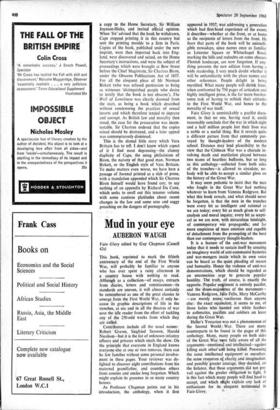11 •
Mud in your eye
AUBERON WAUGH
This book, reprinted to mark the fiftieth anniversary of the end of the First World War, will probably be familiar to anyone who has ever spent a rainy afternoon in a country house with nothing to read. Although as a collection—of essays, extracts from diaries, letters and reminiscences—its standards are uneven, it will almost certainly be remembered as one of the great classics to emerge from the First World War, if only be- cause its graphic descriptions of life in the trenches, at sea and in all the theatres of war save the idle reader from the effort of tackling any of the 250-odd works from which they are culled.
Contributors include all the usual names: Robert Graves, Siegfried Sassoon, Harold Nicolson—but it is the list of unknown infantry officers and privates which steals the show. On the principle that everyone in England knows everyone else at one or two removes, there can be few families without some personal involve- ment in these pages. Your reviewer was de- lighted to discover eight contributions from his maternal grandfather, and countless others from cousins and uncles long forgotten. Which might explain its presence in so many country houses.
As Professor Chapman points out in his introduction, the anthology, when it first appeared in 1937, was addressing a generation which had first-hand experience Of the events it describes—whether at the front, or at home as the recipients of letters from the front. He fears that parts of the book will be unintelli- gible nowadays, since names once as familiar as Leicester Square or Whitechapel Road, marking the hills and redoubts on some obscure Flemish landscape, are now forgotten. If any- thing prevents the new edition from having a wide readership, I very much doubt whether it will be unfamiliarity with the place names and other references. People delight in being mystified. What many people will shrink from, when confronted by 750 pages of articulate and highly intelligent prose, is the far more burden- some task of having to rethink their attitudes to the First World War, and hence to the morality of war itself.
Vain Glory is unmistakably a pacifist docu- ment, in that no one, having read it, could reasonably conclude that the war in which eight and , a half million people lost their lives was a noble or a useful thing. But it reveals quite a different picture from that commonly pur- veyed by thought-leaders - of the modern school. Distance may lend plausibility to the view that the Crimean War was a charade in- volving death and mutilation played between two teams of heartless buffoons, but so long as this anthology—collected from both sides of the trenches—is allowed to circulate; no- body will be able to accept a similar gloss on the history of the Great War.
It may seem pedantic to insist that the men who fought in the Great War had nothing whatever to learn from Vanessa Redgrave. But what this book reveals, and what should never be forgotten, is that the men in the trenches were every bit as intelligent and rational as we are today; every bit as much given to self- analysis and moral inquiry; every bit as scepti- cal as we are now, with miraculous hindsight, of contemporary war propaganda; and far more suspicious of mass emotion and capable of detachment from the prompting of the herd than our contemporary thought leaders: It is a feature: of the anti-war movement today that it needs to sustain itself by creating an imaginary world of anti-communist hysterics and war-mongers inside which its own voice can be heard as the quiet pleading of reason and humanity. Hence the violence of anti-war demonstrations, which should be regarded as an unconscious urge to generate popular hostility. The truth, of course, is exactly the opposite. Popular sentiment is entirely pacifist, and the -drum-majorettes of the movement— Vanessa Redgrave, Jtilie Felix, Mary McCarthy —are merely morel vociferous than anyone else: the exact equivalent, it seems to rne, of those ladies who handed out white feathers to asthmatics, pacifists and .soldiers on leave during the Great War.
Heller's Yossarian was not a phenomenon of the Second World • War. There are many counterparts to be found in the pages of this anthology. Many, many people on both sides of the Great War- mitre fully. aware of all the arguments—emotionil and intellectual—against killing each other' anti being killed. Possessing the same intellectual equipment as ourselves, the same resources qcharity and imagination. and possibly "greater courage, they decided, on the balance, that these arguments did not pre- vail against the greater obligation to fight. It is this fact which many people will find hard to accept, and which night explain any lack of enthusiasm for its eloquent testimonial in Yain Glory.










































 Previous page
Previous page